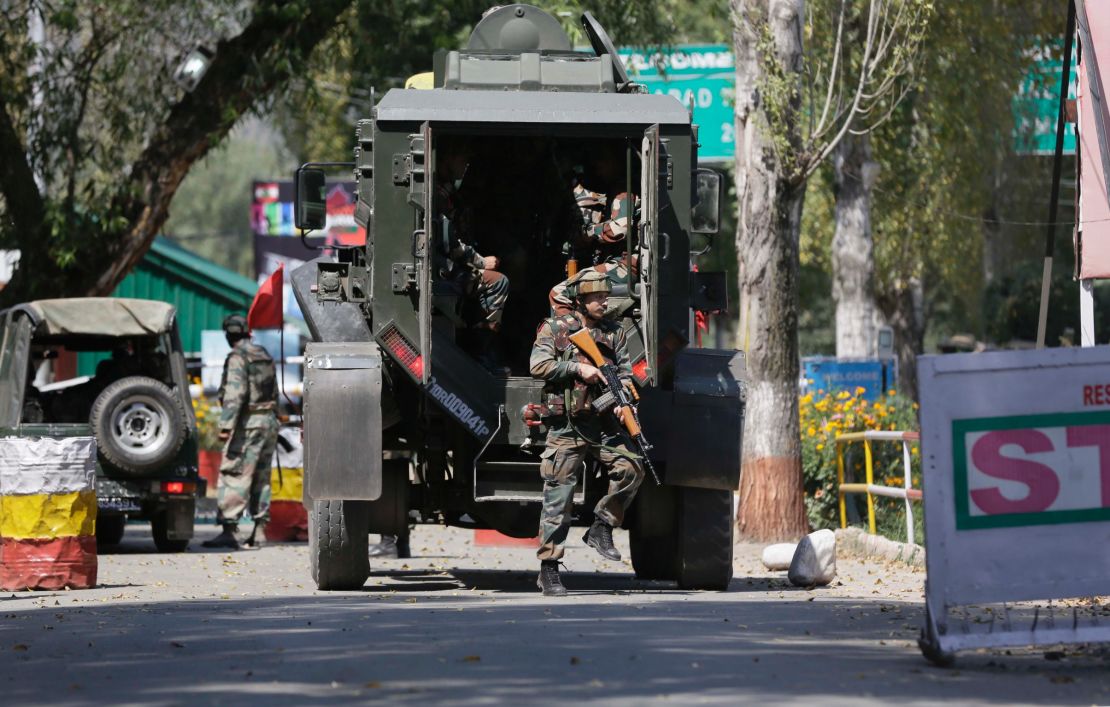Story highlights
"Pakistan is a terrorist state," India Home Affairs Minister says
Militants attacked an army camp in Indian-administered Kashmir, killing 17 soldiers
After one of the deadliest attacks in Indian-administered Kashmir in more than two decades, it appears that a new chapter in the India-Pakistan geopolitical saga has begun.
In the early morning Sunday, armed militants entered an Indian army base in the garrison town of Uri – about 63 miles (102 kilometers) from Srinagar, the capital of Indian-administered Jammu and Kashmir – killing 18 soldiers.
Several hours later, four militants were killed in a shootout with the Indian army. It’s unclear which militant group is responsible.
The attack, which took place near the de facto border between India and Pakistan in the disputed region, was one of the deadliest on an army base in Kashmir since militant attacks began in 1989.
Now the blame-game has begun and Pakistani-Indian relations have reached fever pitch yet again.

Name calling
India’s Home Affairs Minister responded to the attack by calling Pakistan a terrorist state, but he stopped short of blaming the country for the attack.
“Pakistan is a terrorist state and it should be identified and isolated as such,” said Rajnath Singh, India’s Home Affairs Minister, Sunday on Twitter. He said that the people involved in the attack were, “highly trained, heavily armed and specially equipped.”
Singh added he was “deeply disappointed with Pakistan’s continued and direct support to terrorism and terrorist groups.”
However he did not offer any facts to support his assertion, nor did he say whether he believes Pakistan was involved in the attack.
CNN has reached out to Singh and a government spokesman for comment.
Pakistan’s Ministry of Foreign Affairs responded to India’s allegation with a swift denial. Spokesman Nafees Zakaria told CNN, “This is a very irresponsible and baseless allegation that he has leveled against Pakistan which we outrightly reject.”
He blamed India for fostering Kashmir’s unrest.
“India is desperately looking for ways to deflect the world’s attention from the situation in India-occupied Kashmir,” Zakaria said. “Pakistan investigates and does not give knee jerk reactions whenever any such incident takes place. We reject these claims.”
Singh called an emergency meeting with his senior officials and announced via Twitter that he was postponing visits to Russia and the United States to deal with the situation.
New dynamic of the conflict
After a few years of relative calm in Indian-administered Kashmir – largely considered one of the world’s most tumultuous geopolitical flashpoints since the India-Pakistan partition – the region has been gripped by unrest for more than two months.
Demonstrations began in July after the Indian army killed Burhan Wani, the commander of the separatist group Hizbul Mujaheedin.
Police described the 21-year-old’s killing as a major success in their campaign against separatist militants, but angry mobs protested against his death and attacked police stations, police posts and government buildings.
Since Wani’s death, protests have prompted authorities to issue curfews and lock down large parts of the region.
Rise in death tolls
At least 85 people have been killed in the past 72 days in clashes between protesters and security forces.
On Saturday, thousands of people defied a curfew to attend the funeral of Nasir Shafi, an 11-year-old boy found dead on Friday on the outskirts of Srinagar.

Residents told CNN that Shafi’s body was riddled with pellet gun wounds, which Indian police and security forces have been using to disperse protesters. Police said the boy was hit with pellets during clashes between the two groups.
A doctor at Srinagar’s SMHS hospital said 756 people have been hit in the eyes by pellets over the past 72 days – an injury so common in the region The New York Times said 2016 “will almost certainly be remembered as the year of dead eyes.”
“Thirty-eight received pellet injuries in both eyes,” Dr. Tariq Qureshi, head of the hospital’s Ophthalmology department said.
CNN’s Sophia Saifi, Sheena Jones, Rich Phillips and Chieu Luu contributed to this report

